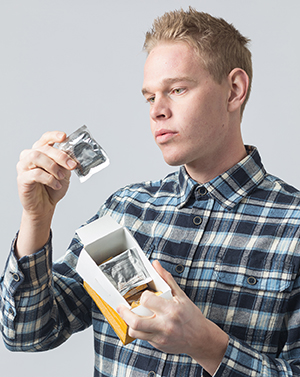For Teens: Understanding Chlamydia
Chlamydia is an STI (sexually transmitted infection) that spreads when body fluids are passed during sex. An STI may also be called a sexually transmitted disease (STD). Signs of chlamydia are often absent or hard to notice. So get checked if you think you might have it or could have been exposed to it. Chlamydia can be cured. But if it’s not treated soon enough, it can cause sterility. This can prevent you from being able to have children. It can also cause other long-lasting health problems.
 |
| Use latex condoms to help prevent the spread of STDs like chlamydia. |
Gender words are used here to talk about anatomy and health risk. Please use this information in a way that works best for you and your provider as you talk about your care.
Chlamydia infection is most common in sexually active people 24 or younger. In females, it can cause serious problems like pelvic inflammatory disease, ectopic pregnancy, and infertility. For this reason, yearly screening for chlamydia is recommended for all sexually active females age 24 or younger and females age 25 and older who are at risk for infection.
What to look for
Often, chlamydia causes no symptoms. Or symptoms may appear within a few days or weeks after you have been infected. The symptoms can also change over time. Early on, common signs include:
-
Discharge from the penis, vagina, or rectum
-
Pain or burning during urination
-
Pain or bleeding from the rectum
-
Abnormal vaginal bleeding
-
Pelvic pain
Treatment
Chlamydia can be treated. It can be cured with antibiotics. A single dose may be all that’s needed. But sometimes you need an antibiotic twice a day for a week or longer. Complete your antibiotics exactly as directed by your healthcare provider. Don't have sex until your provider tells you it's OK. Generally, this is for 7 days after completing the antibiotics. Your partner(s) also needs to be treated. Otherwise your partner can pass the disease back to you.
If you don’t get treated
Chlamydia can spread and cause damage that keeps you from being able to have kids in the future. Or it can cause long-lasting pain, scarring, or other damage to the genitals or rectum. Here are some warning signs of that damage:
-
Men can have continued discharge, pain, and swelling in the testicles or rectum. They may also have a fever.
-
Women can have chronic pelvic pain or abnormal vaginal bleeding. These are two of the possible signs of pelvic inflammatory disease (PID).
What is PID?
Pelvic inflammatory disease (PID) is an infection of the reproductive organs in women. It can cause mild or severe symptoms. These include pain in the lower belly, fever, vaginal discharge, and pain during sex. Over time, PID can damage the reproductive organs. It can make it hard or impossible to have children naturally in the future.